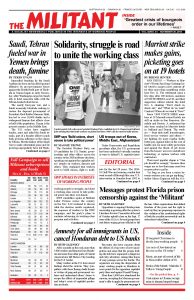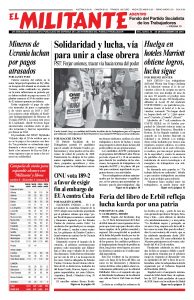“Music is my life. It’s amazing to hear it in Mosul again,” musician Fadhel al-Badri told Reuters Oct. 27. He was attending a symphony performance, the first concert in that Iraqi city since the expulsion of Islamic State last year. The show was part of broader efforts by working people to rebuild their lives, including the revival of music, literature and the arts, in the wake of IS repression and the devastation of the U.S.-led wars in Iraq.
Al-Badri had hidden his violin and oud, an Arabic stringed instrument, during the reactionary Islamist group’s three-year occupation of the city.
The orchestra was made up of professional musicians from the Peace Through Arts Farabi Orchestra from Baghdad, led by renowned cellist Karim Wasfi, and local amateurs. Hundreds came to the performance of Vivaldi’s “Four Seasons,” alongside Iraqi classical music. The following weekend musicians from across the country came to play at the annual Iraqi Song Festival, which includes performances of traditional folk music, held at the city’s university. Wasfi’s orchestra performed again Nov. 10 in the more heavily damaged western part of the city, close to a building where Islamic State had executed gay and lesbian Iraqis by throwing them off the roof.
IS seized Mosul in 2014 after the Iraqi army crumbled and its soldiers fled the country’s second largest city, leaving its inhabitants unprotected to face the anti-working-class sect. Morality police patrolled streets, meting out swift, sometimes deadly, punishment for infringement of its rules. Most of the hundreds of thousands of books used by students and teachers at Mosul University’s library were burned by IS.
“We continued to consume culture in secret: we would listen to music, trade books, films, music. That never stopped even though it was dangerous,” photographer Ali al-Baroodi told Reuters.
Mosul — one of the two capitals established by Islamic State as it seized large swaths of Syria and Iraq in the midst of the years of wars there — was eventually retaken street by street by Iraqi and Kurdish peshmerga troops, backed by U.S. air power. The bombing and fighting further damaged the city, causing thousands more to flee.
As part of efforts to revive culture, Baroodi has organized photographic exhibitions and is part of a group that has launched an international book drive to replenish the university library. Defying fears of new attacks, these artists and other activists have held weekly book sales on city streets. Some have begun painting murals.
Wasfi is renowned for performing cello recitals on streets across Baghdad where Islamic State car bombings caused destruction and death. In the face of relentless terror attacks his defiant performances are aimed at “sharing hope, perseverance, dedication and preserving the momentum of life,” he says.
In an interview with Al-Jazeera in 2015, Wasfi was asked whether at a time of war, wasn’t music an inappropriate “indulgence” amid people’s struggles for “basic necessities.”
“It is needed as much as food, as much as oxygen, as much as water,” he responded, “because it refines and cultivates. Because it inspires people.”

